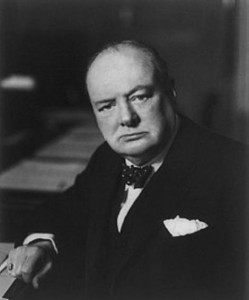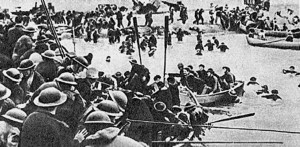When analyzing the causes of the improbably rapid downfall of France in 1940, it would be amiss not to mention the wonderful plan developed by German General Erich von Manstein. But the Brits made an equally important contribution to France’s defeat.
The English gave no thought to rescuing France and, unexpectedly for the French commanders who were directing the joint struggle, they ceased to carry out French orders. In his book, Churchill himself unabashedly quotes the telegram he received from French Prime Minister Paul Reynaud on May 24, 1940: “… the British Army had carried out, on its own initiative, a retreat of twenty-five miles towards the ports at a time when our troops moving up from the south are gained ground towards the north, where they were to meet their allies.”[1]
The diplomatic language hides a very simple point. Germany’s armored fist smashed a giant hole in the Allies’ defense, and the Nazis rushed into the resulting breach. However, defeat could be transformed into victory. The plan devised by French General Maxime Weygand, which was adopted on May 21, 1940, was hardly remarkable for its originality. The decision was made to launch a bidirectional counterattack from the north and south in order to overpower the German divisions wedged in there and, once those had been wiped out, to merge the different units of Allied troops, which were currently positioned at a distance of 50 to 90 km. from each other. If this counterattack had succeeded, France’s imminent downfall would never have occurred, because Hitler would have been deprived of his armored battering ram.
But when the French troops moved in for the counterattack, i.e., in a forward direction, the British instead moved backward! “In the evening of the 25th Lord Gort took a vital decision. His orders still were to pursue the Weygand plan of a southerly attack towards Cambrai, in which the 5th and 50th Divisions, in conjunction with the French, were to be employed … Gort now abandoned the Weygand plan.”[2]

And so that was that – he simply ditched the plan! During the battle’s most crucial moment, British General Gort committed an offense that would normally result in an army court martial. Why did the British general break his oath at the most crucial moment? Well that’s the point, he didn’t break anything. His French commanders ordered him to attack, but his order to retreat came from London! General Gort carried out the instructions from his immediate British commanding officers and did not simply decide to relinquish his position without authorization. “Gort’s refusal to engage in the battle had Churchill’s full approval. However, in the days that followed, the British prime minister[3] continued to pretend that he agreed to have the British Expeditionary Force take part in the ‘Weygand counter-offensive.’ To desert an ally at the most critical moment of the battle but to still save face – that was the policy of the British Cabinet.”[4]
So let’s compare dates in order to dispel any lingering doubts. On May 22, 1940, Prime Minister Churchill arrived in France; on May 24, British troops began their retreat to Dunkirk. Is it possible to believe that over the course of two days General Gort never contacted the head of his government, never briefed him, and simply decided on his own to sign France’s death sentence?
The perfidy of this decision by the cabinet in London cannot be disguised with arguments about its strategic necessity. What’s surprising is that unlike their English counterparts, the French generals believed Weygand’s plan was quite feasible. However, once one part of the Allied army began advancing “backward,” the whole plan collapsed. With it collapsed the last hope of stabilizing the front. But why did the British behave so dishonorably in that dark hour?
We have come to yet another puzzle from that war. To solve it, we need to remember the direction in which the British divisions moved when they began their retreat. Naturally it was toward Dunkirk, which at that time was the only port from which the British could be evacuated home.
But there was a hitch, in that the British could not evacuate. Unless they received help from … Adolf Hitler. The military situation was such that at the time of the British retreat toward Dunkirk, German tanks were already positioned along the access routes. The tanks converged on Dunkirk two days before the British began their march – the Germans were only 16 km. from the city, while the British were still 60 km. away. It would have been a simple matter for the Germans to enter the defenseless city and occupy the last harbor from which any mass evacuation of British troops could take place. But Hitler issued his famous “Halt Order” which banned any further advance. “We were struck dumb,” recalled Heinz Guderian. And for good reason! At the moment when all that remained was to occupy a single small town in order to seal the fate of the enemy forces, the leader of Germany expressly forbade it. Things got to the point that General Halder raised objections to the Führer’s decision, trying to explain to him why it was necessary to capture the last port on the coast. But the Führer could not be swayed: “The excited discussion finished with a definite order by Hitler, to which he added that he would ensure execution of his order by sending personal liaison officers to the front.”[5]

Everywhere and at every opportunity the British abandoned their allies to their fate. They always evacuated when threatened with defeat. So it was in Walcheren in 1809, in Gallipoli in 1915, and it happened again between May and June 1940 in Norway. One need not be a fortune-teller to predict what Great Britain would do this time. But there was no need to have to guess whether they would try to bail out from Dunkirk, since there was simply no other option! Hitler issued his “stop order” on the morning of May 24, and, based on Churchill’s memoirs, the British began their withdrawal also on the 24th, but did not manage to retreat to Dunkirk until the evening of May 25, and thus the Germans had to “wait” for them for almost two days. Any comparison of these facts will soon lead to the conclusion that the “proud Britons” did not in fact fight to the death against the scum of the earth, but rather were continually entering into secret negotiations with him.
No Western historians ever explain the significance of the “stop order.” Everyone just writes: “Hitler stopped his tanks.” And the reader is given the impression that that oddball Führer was simply looking after his tank operators, and so did not permit them to storm the British positions at Dunkirk. But in reality, the city was empty! For two days the Germans just sat around at Dunkirk waiting for the Führer’s order to proceed. And he in turn waited, until the port and city were occupied by the retreating British divisions. Only on May 26, 1940 did Hitler once again permit his troops to push ahead, but by that time the British had dug in and were able to repel the German attacks. And when did the British officially begin their evacuation? If our prediction is correct, not until Hitler’s order to continue the offensive. And sure enough, the day before – on May 25 – Churchill ordered the evacuation to begin …
Taking advantage of this kindly presented opportunity, from May 27 to June 4, 1940 Great Britain successfully carried out Operation Dynamo, pulling over 338,000 soldiers off the continent, including 215,000 from the British military. The remaining 123,000 consisted of French, Belgians, and soldiers of other Allied countries.
In the very first hours of the attack on France, the German air force bombed French airfields, destroying most of the airplanes there. After that the Germans were the masters of the skies. The French desperately requested air assistance from the Allies but it never came. Charles de Gaulle wrote bitterly of this in his memoirs:
“Since the re-embarkation of the British army at Dunkerque, the Royal Air Force had no longer been cooperating in the battle, save in an episodic fashion … the British squadrons, being based in Great Britain, were too far away to be of use to a front continually withdrawing southwards. To my pressing request that he should transfer at least a part of the British army cooperation air force to the airdromes south of the Loire, Mr. Churchill gave a formal refusal.”[6]
This is a perfect example of backroom politics. Realizing that the war in France was already lost, the British made contact with Hitler, communicating with him using one of the channels that were still open. The British demand was simple: to allow their army to be evacuated. And why should Hitler agree to this? The main argument in their favor was the carte blanche the British had given Hitler to sack France. London cynically used France as a bargaining chip, the same way she had earlier conceded Austria, Czechoslovakia, and Poland. Second, if the British forces in Europe were decimated, that would be a direct invitation to the US to enter the war against Germany, which would not have been at all to Hitler’s liking.
As a result, France surrendered on June 22, 1940. Over 60% of the French army – 1,547,000 out of the 2.5 million members of the army at home – were taken prisoner. Although France had been utterly routed, her casualties included only 84,000 dead, which is in itself evidence that no serious resistance was offered to the Germans. The German Wehrmacht fared much better, losing only 28,000 soldiers. For comparison – during the First World War the Kaiser’s army had to bury 1.8 million of its troops, but still could not whip the French.

ORIENTAL REVIEW publishes exclusive translations of the chapters from Nikolay Starikov’s documentary research ““Who Made Hitler Attack Stalin” (St.Petersburg, 2008). The original text was adapted and translated by ORIENTAL REVIEW.
ENDNOTES:
[1] Winston Churchill, Their Finest Hour (Boston: Mariner Books, 1986) 62.
[2] ibid, 74.
[3] Churchill became prime minister on the afternoon of May 10, 1940 immediately after the onset of the German offensive, which had begun that morning.
[4] Daniil Proektor, Blitskrig v Evrope: Voina na Zapade. (Moscow, 2004) 253.
[5] Winston Churchill, Their Finest Hour (Boston: Mariner Books, 1986) 68.
[6] Charles de Gaulle, The Complete War Memoirs of Charles de Gaulle (New York: Carroll & Graf Publishers, 1998) 58.
PREVIOUS EPISODES
Episode 14. How Adolf Hitler turned to be a “defiant aggressor”
Episode 13. Why London presented Hitler with Vienna and Prague
Episode 12. Why did Britain and the United States have no desire to prevent WWII?
Episode 11. A Soviet Quarter Century (1930-1955)
Episode 10. Who Organised the Famine in the USSR in 1932-1933?
Episode 9. How the British “Liberated” Greece
Episode 7. Britain and France Planned to Assault Soviet Union in 1940
Episode 6. Leon Trotsky, Father of German Nazism
Episode 5. Who paid for World War II?
Episode 4. Who ignited First World War?
Episode 3. Assassination in Sarajevo














I like these episodes a lot.
»And why should Hitler agree to this? The main argument in their favor was the carte blanche the British had given Hitler to sack France. … Second, if the British forces in Europe were decimated, that would be a direct invitation to the US to enter the war against Germany, which would not have been at all to Hitler’s liking.«
How would “sacking France” have been useful to Germany? Maybe an individual such as Göring had an interest in œuvres d’art, but here it was Hitler making the decision, and I absolutely don’t think that he was motivated by any concern for “sacking”. He was interested in restauring Germany, period. Furthermore, “sacking France” wouldn’t have required any permission by the Brits, so why bother negotiating it with them? This point doesn’t seem to make sense to me.
As for a complete defeat of the British expeditionary forces triggering a Usanian entry into the war, I’m wondering whether this could be corroborated by official German documents. Of course Hitler tried to avoid open war with the US as long as possible. So, this point can’t be light-handedly refuted.
As long as no significant advantage for Germany linked to allowing the “Dunkirk miracle” to happen can be presented, I’ll continue to think that Hitler made an unfortunate (and inexplicable) mistake by stopping Guderian.
Pingback: Qui a signé la condamnation à mort de la France en 1940 ? (II) | Réseau International
Pingback: Who signed death sentence for France in 1940? (II) | Réseau International (english)
I’ve read an account that justifies Hitler’s stop order as a gesture to the British that Hess’ mission was a serious overture to the British aristocracy to enter into a treaty with Germany against Soviet bolshevism, as is tendered elsewhere in these pages. The reason that this rationale is swept under the rug is because it amplifies the fact that the British aristocracy, as well as the French aristocracy and the other aristocracies in Europe were generally anti-bolshevik and pro Hitler, as they remain to this day. Had Churchill and elements of the factory owning aristocracy not been pig headed empire building economic nationalists, we would all be singing the Horst Wessel Lied on our way to work every morning. If you want to know what “aristocracy” means, Wikipedia Compte de Gobineau.
Pingback: Keep It Real: A Review Of Diana Johnstone’s Book “Circle In The Darkness: Memoirs Of A World Watcher” – OrientalReview.org – DE LA GRANDE VADROUILLE A LA LONGUE MARGE